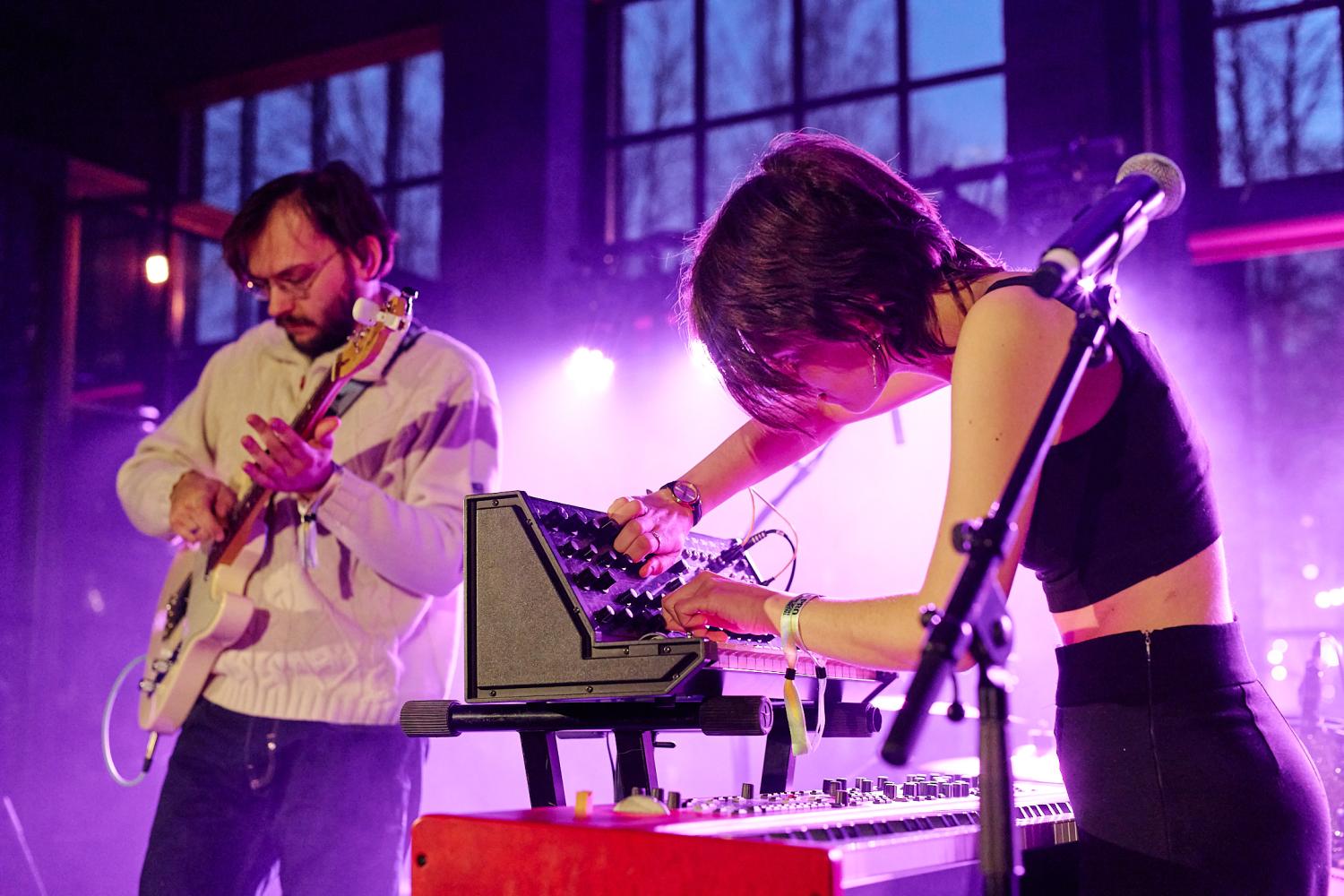

Iva Damjanovski and Viktor Tanaskovski of Alembic discuss their evolving sound with our Croatian member Močvara, from folklore and field recordings to electronics, ahead of their Zagreb performance on 26 August.
Can you say a couple of words about who you are and your work so far?
We are Iva Damjanovski and Viktor Tanaskovski. For our upcoming Zagreb performance and our second album, we are joined by Andrea Mircheska and Dragan Teodosiev, with Filip Efinski contributing exclusively to the album.
In your Radiomof interview, you described wanting “technology… to honor nature… to work together in a beautiful synthesis.” How has that vision evolved since your debut album — and have you found new ways for nature and technology to collaborate in your music?
Although our second album does not address this theme as directly, our fascination with it continues. We believe in the symbiotic relationship between opposites—a paradox that drives our work. Since the release of our first album, we have engaged in numerous projects exploring similar ideas, from creating music with soundscapes and field recordings to participating in performances in nature. We still consider this subject deeply relevant, continually seeking new perspectives on the compelling conflict at the heart of the human condition.
To what extent does Macedonian culture shape your music, and where do you feel your sound exists beyond geography?
This influence is deeply present in our work, audible in our melodies, timbres, and the use of irregular rhythms. Still, we strive to honor it without referencing it too literally—especially since we feel that our folklore has often been exoticized. For us, cultural heritage should never be reduced to a musical gimmick. At the same time, we draw inspiration from music across the world, regardless of its geographic origin. Our approach is to continually blend diverse influences, aiming for originality not through invention out of nothing, but through an innovation born of connection.
What is your favourite venue/festival where you performed so far and why?
It’s hard to choose a single favorite, but one that stands out is our recent performance in Kochani at the Rasplet Festival. It was emotionally intense yet beautiful and hopeful, made even more meaningful by the fact that it was organized by young people for a mostly young audience, coming together to support their town after a recent tragedy. We also loved performing in Padova for Echoes of Heritage, as it involved exciting and fun collaborations. Equally special was our performance at the Sepak se Vrti festival—a homecoming concert after a tour that meant a great deal to us, and particularly significant since the festival carries the name of one of our choruses. Our Paris concert at Sikai’s studio remains dear to us as well, for its warm and intimate atmosphere (and for coinciding with Viktor’s birthday). And finally, our appearance at the PIN Music Conference was unforgettable—not so much because of the festival itself, but because of the incredible audience.
Have you ever improvised something on stage that later became a recorded track?
Yes! It’s actually the story behind our song “Лет во Место” (“Let u Mjestu”) which started as a super simple improvisation in D, and the entire song just stays in D. That’s why it’s called “Let u Mjestu” (meaning a static flight, but at the same time an homage to a play by Goran Stefanovski).
Viktor, you handle a lot of string work; Iva, you bring in keys, theremin, and vocal textures. How do you avoid stepping on each other’s sonic space?
We approach our instruments as tools with the potential to go beyond their traditional roles. For example, through various gadgets and techniques, the guitar can transform into a bass, a string section, a synth pad, or even a percussion instrument. We choose these roles depending on what the music requires—or rather, what it is missing. The rest of the sonic space is then shaped by the other instruments: the theremin, which can take on the qualities of a voice or a bowed string instrument (when the guitar isn’t already filling that role), or the analog synth, which can step in as a bass when needed. In this way, each instrument adapts to create balance and richness within the composition.
Some people hear experimental music as “difficult.” Do you want to meet the listener halfway, or is discomfort part of your intent?
Yes and no. Both of us like really crazy music that’s for sure and we do appreciate making the audience uncomfortable, but we don’t consider “Alembic” to be a project that is purely experimental. What we do can definitely be classified as pop at times. We have other projects where we are much more raw and atonal, but with Alembic we are trying to make “new” music, rather than just play sonic games - we take it a bit more seriously. We do however like to put “nasty” or noisy sounds on top of a well structured composition, or the reverse, adding a nice melody on top of a dissonant sonic surface, again as a means to intensify emotion.
Have you ever been surprised by how a listener interpreted one of your tracks — in a way you never intended
We can probably say that Dynamo is one of our songs that was never intended to evoke nostalgia, but this might have a lot to do with its music video - neither the music, nor the lyrics are dealing with such subjects. Anyway, we do not mind, especially since it started having the same effect on us too :)
If your next project had to be only one of the two — purely acoustic or purely electronic — which would you choose and why?
Viktor: Purely acoustic. I’d like to explore new fields that I haven’t really worked in.
Iva: Purely electronic, because I’m really into analog synths right now, and I am trying to see how far that can be pushed.
I guess we are disbanding for that one.. haha
Your debut album came out in 2022. Have you been exploring ideas for what might come next?
The next would be our second album, which we already started recording, and some of this new material will be played in Mochvara with our new line-up.



























